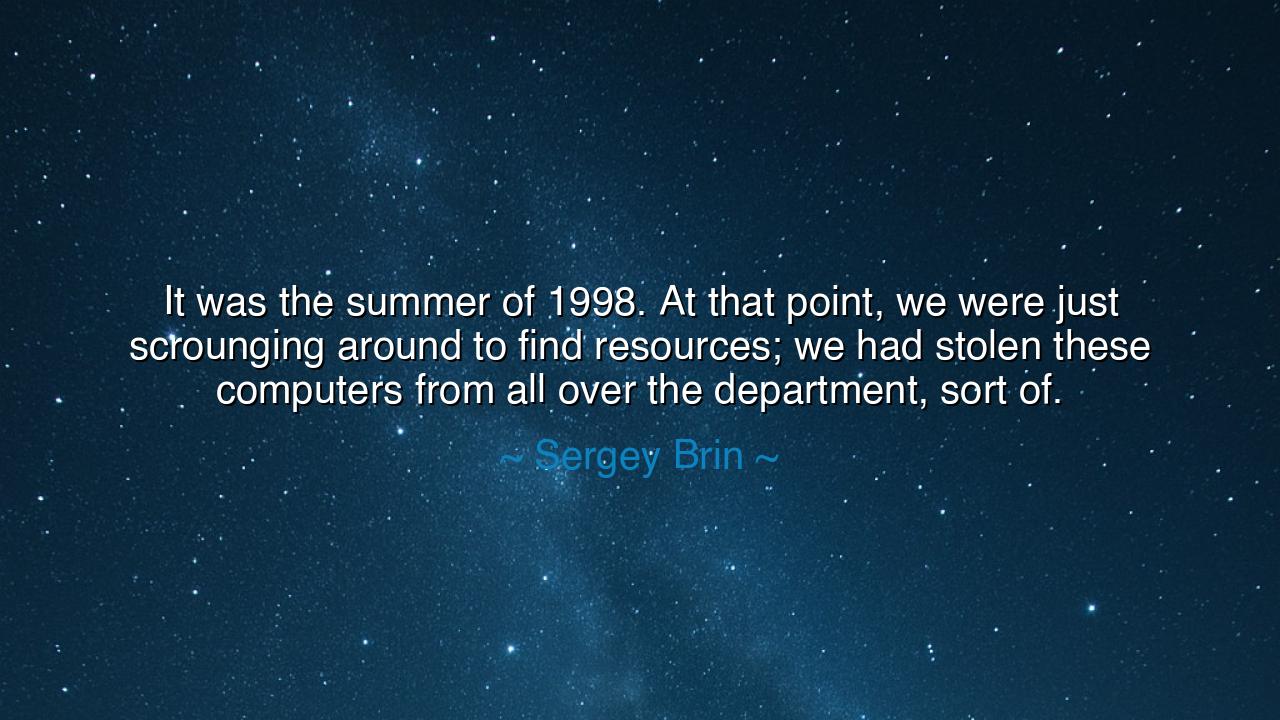
It was the summer of 1998. At that point, we were just scrounging
It was the summer of 1998. At that point, we were just scrounging around to find resources; we had stolen these computers from all over the department, sort of.






"It was the summer of 1998. At that point, we were just scrounging around to find resources; we had stolen these computers from all over the department, sort of." These words, spoken by Sergey Brin, reflect a moment of humility and struggle in the early days of what would become one of the most transformative companies in modern history: Google. Brin’s recollection of the humble beginnings of Google serves as a reminder that even the most extraordinary achievements often begin in the most modest and imperfect circumstances. This quote speaks to the power of perseverance and the resourcefulness required when dreams are still in their infancy, when success is not yet guaranteed, and when every small victory must be fought for, often with limited means.
In the ancient world, there was a deep understanding of the necessity of struggle in the pursuit of greatness. The Greeks spoke often of the heroic journey, where a great hero like Hercules or Perseus had to endure trials, face adversity, and make sacrifices in order to achieve their goals. The path to success was rarely a straight line; it was filled with obstacles, shortcomings, and moments of desperation. In many ways, Brin’s reflection echoes the journey of these ancient heroes. Before Google could emerge as a powerful force, it too had to endure its own trials—where every piece of technology, every resource, and every idea was scratched together from whatever could be found.
Consider the story of Leonardo da Vinci, whose genius was not immediately recognized. In his youth, he was often rejected by the artistic elite and faced poverty and lack of resources. Yet, like Brin, da Vinci never allowed his circumstances to define his future. Instead, he improvised with whatever materials he could find, often working in obscurity, before his genius was recognized by the patrons who would later fuel his work. Da Vinci’s struggle, much like Brin’s, was one of resourcefulness in the face of adversity. His ability to turn limitations into strengths is a timeless lesson in how greatness can arise from the humblest of beginnings.
The story of Google is a modern-day example of this ancient wisdom. In the early days of the company, Brin and his co-founder Larry Page were not in lavish offices with massive budgets or guaranteed funding. Instead, they were scrambling to put together the necessary resources to build their vision. They were not afraid to scrape together what they could, even if it meant “stealing” computers from other departments. This was a form of creative adaptation, the very act of using what is at hand in order to achieve something greater. In the ancient world, this would be seen as a form of resourcefulness, where even the humble could rise through ingenuity and hard work.
As we move through the modern world, the lesson from Brin’s reflection is one of endurance and innovation in the face of scarcity. In today’s high-tech landscape, it is easy to forget that even the most successful companies—those that have now become household names—began with nothing but a vision and a few borrowed resources. Just as Brin and Page were able to forge the tools they needed to build Google, we too must be able to adapt to whatever challenges lie in our path. Success is not always a matter of having the best resources or the most support—it often comes from the creativity and grit to make something from nothing.
The lesson here is one of perseverance and resourcefulness. Whether we are building a business, creating art, or pursuing a dream, the path is rarely easy or clear. Instead, we must often make do with what is available, improvise, and work tirelessly in the face of uncertainty. The humble beginnings of Google remind us that no dream is too big to start small, and no resources are too limited to create something transformative. Every moment of struggle, every moment of lack, is simply an opportunity for innovation.
In practical terms, this means we must not be discouraged by the scarcity we face but rather look for the opportunities within it. Just as Brin and Page scrounged for computers, so must we find ways to use the tools we have at hand to pursue our passions and make our visions a reality. Let us take heart in the knowledge that greatness is often born not from abundance, but from ingenuity and the relentless pursuit of our goals, even when the odds seem stacked against us. Success may not come quickly or easily, but with perseverance and resourcefulness, we can overcome the obstacles and build something truly remarkable.






AAdministratorAdministrator
Welcome, honored guests. Please leave a comment, we will respond soon